Ever stared at your hairbrush and felt anxious as more strands fall out? You’re not alone. Hair loss can really affect your confidence and how you see yourself.
Learning about vitamins for hair growth is more than just stopping hair loss. It’s about getting back your self-confidence. A 2021 study on Nutrafol showed great results for women aged 40 to 65 with thinning hair. This gives hope to those dealing with hair loss.
It’s normal to lose 100-150 hairs a day. But stress, hormonal changes, and what you eat can really affect your hair. The hair growth cycle is seven to nine years, so eating right is key for healthy hair.
This guide will explore the best vitamins for hair growth. We’ll look at science-backed ways to help your hair grow strong. Whether you’re dealing with hair loss after having a baby or want to prevent it, knowing the right nutrients is a big step toward better hair.
Table of Contents
Understanding Hair Growth and Nutrition
Your hair’s health is closely tied to what you eat. Hair growth shows more than just how you look. It shows how well you’re doing overall. Knowing how diet affects hair can help you keep your hair strong and healthy.
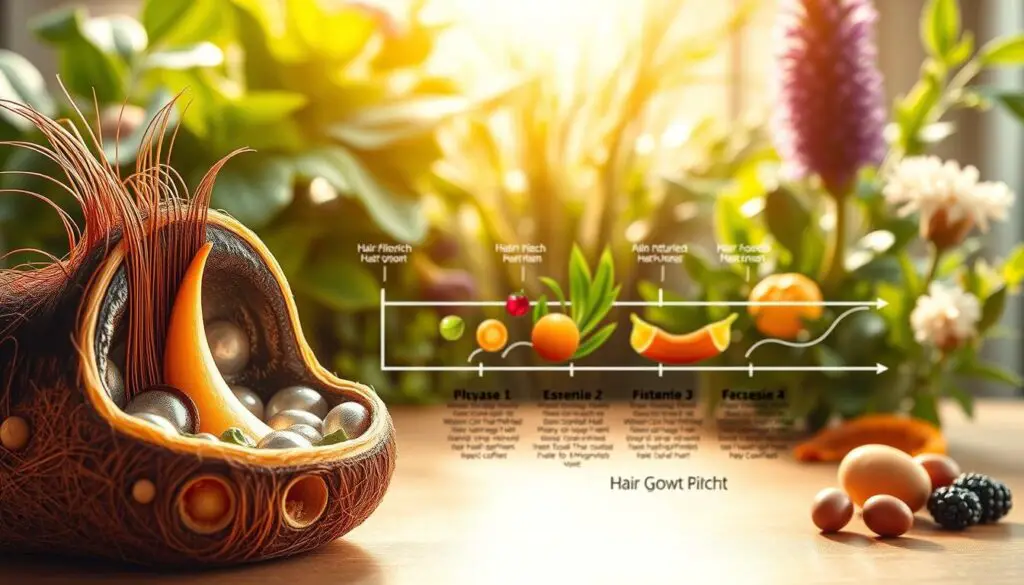
Hair is mostly made of protein. So, eating the right foods is key to keeping it strong. On average, each person has about 100,000 hair shafts. Each one grows for about 3.5 years.
The Hair Growth Cycle Explained
The hair growth cycle has three main stages:
- Anagen (Active Growth Phase)
- Catagen (Transition Phase)
- Telogen (Resting Phase)
It’s normal to lose 50 to 100 hairs a day. Things like your genes, diet, and health can affect this.
How Nutrition Affects Hair Health
Antioxidants are important for protecting hair follicles. Vitamins A, C, and E help fight off damage that can slow hair growth.
“Nutrition is the foundation of healthy hair growth” – Dermatological Research Institute
| Nutrient | Daily Recommended Intake | Hair Health Impact |
|---|---|---|
| Protein | 46-56 grams | Essential for hair structure |
| Vitamin A | 700-900 mcg | Supports sebum production |
| Vitamin C | 75-90 mg | Promotes collagen production |
| Zinc | 8-11 mg | Supports hair tissue growth |
Not getting enough nutrients can harm your hair. A diet full of protein, vitamins, and minerals is important for healthy hair.
Essential Vitamins for Hair Growth
Unlocking the secret to vibrant, healthy hair starts with understanding the critical role of vitamins. Certain nutrients play a powerful part in promoting hair growth and maintaining strong, resilient strands. Let’s explore the key vitamins that can transform your hair health.
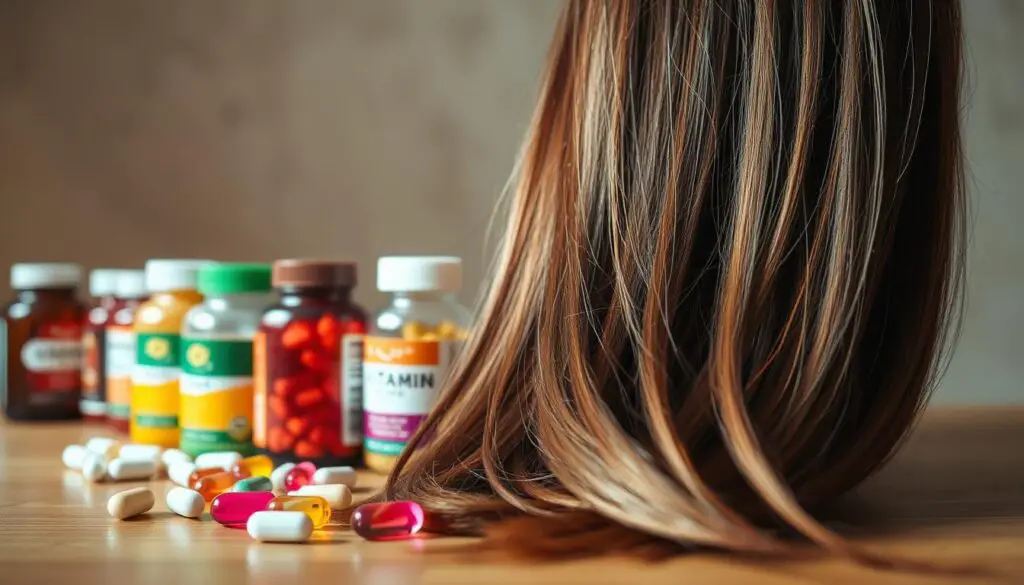
Vitamin A: Nourishing Hair Follicles
Vitamin A is crucial for hair production. It helps your body produce sebum, the natural oil that keeps your scalp moisturized. Without adequate vitamin A, your hair can become dry and brittle. But, too much can lead to hair loss.
B Vitamins: Biotin’s Powerful Impact
Biotin is a standout vitamin for hair growth. It helps your body metabolize proteins essential for hair strength. Adults need about 30 mcg of biotin daily. Without it, you might see:
- Thinning hair
- Brittle nail texture
- Skin problems
Vitamin C: The Antioxidant Defender
Vitamin C does more than boost immunity. It’s vital for collagen production and protects hair follicles from damage. This antioxidant also helps your body absorb iron, another key nutrient for hair growth.
Vitamin D: Activating Hair Follicles
Low vitamin D levels are linked to hair loss. Adults need 15 mcg daily. Vitamin D helps create new hair follicles and may reactivate dormant ones, potentially reducing hair thinning.
“Nutrition is the foundation of healthy hair growth” – Hair Health Expert
Remember, while vitamins are crucial, a balanced diet and holistic approach to hair care yield the best results. Consult with a healthcare professional to determine your specific nutritional needs for optimal hair health.
How to Incorporate Vitamins into Your Diet
Healthy hair starts with good nutrition. Your diet is key to hair growth and avoiding hair loss. It’s important to eat right.
Foods Rich in Essential Vitamins
Finding the right foods can boost your hair vitamins naturally. Here are some great options:
- Iron-rich foods: Lean meats, spinach, and lentils
- Zinc sources: Pumpkin seeds, oysters, and beef
- Vitamin-dense foods: Eggs, sweet potatoes, and citrus fruits
Supplements vs. Whole Foods
Whole foods are best, but supplements can help too. Zinc and iron supplements are good for those with deficiencies. Always talk to a doctor before taking supplements.
Daily Recommended Intakes for Hair Growth
Knowing how much vitamin you need is important for hair health. Here are the daily amounts:
| Nutrient | Daily Intake | Key Benefits |
|---|---|---|
| Biotin | 30 micrograms | Supports hair protein production |
| Iron | 45 milligrams | Prevents hair loss |
| Zinc | 11mg (men), 8mg (women) | Promotes hair tissue growth |
“Nutrition is the foundation of healthy hair growth” – Hair Health Expert
Good nutrition takes time. Most people see hair growth improvements in 3-6 months. Eating well is key.
Benefits of Biotin for Hair
Biotin is a powerful B-vitamin that helps keep hair healthy. It supports the keratin in your body, which is key for hair, skin, and nails.
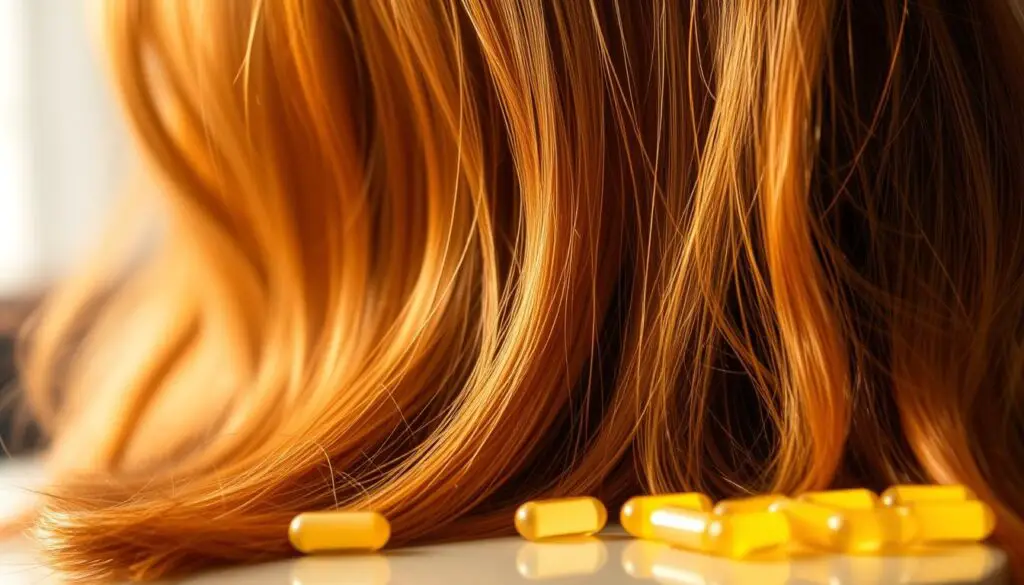
The Science Behind Biotin
Biotin strengthens hair follicles and promotes growth. It helps break down proteins needed for hair. A lack of biotin can weaken hair and cause loss.
- Supports keratin production
- Enhances hair strength
- Promotes cellular energy metabolism
How to Use Biotin Safely
Knowing how much biotin to take is important for hair health. The FDA says adults should get 30 micrograms daily.
| Age Group | Recommended Daily Intake |
|---|---|
| Adults | 30 mcg |
| Pregnant Women | 35 mcg |
| Teenagers (14-18) | 25 mcg |
“Biotin is not just a supplement, it’s a foundation for healthy hair growth.” – Nutrition Experts
Eat foods rich in biotin like eggs, salmon, and beef liver. If you need supplements, talk to a doctor first.
- Best food sources of biotin:
- Beef liver
- Eggs
- Salmon
- Almonds
Biotin helps with hair health, but it’s not a magic fix. Good nutrition, hair care, and health are also key for great hair.
The Importance of Vitamin E
Vitamin E is a strong antioxidant that helps keep your hair and scalp healthy. It’s key for hair growth and protection. Your hair needs many nutrients to stay healthy, and vitamin E is one of them.
How Vitamin E Promotes Circulation
Your hair follicles need good blood flow to stay healthy. Vitamin E boosts blood flow to the scalp. This helps nutrients and oxygen reach your hair roots.
As an antioxidant, it fights off free radicals. These can harm hair cells and slow growth.
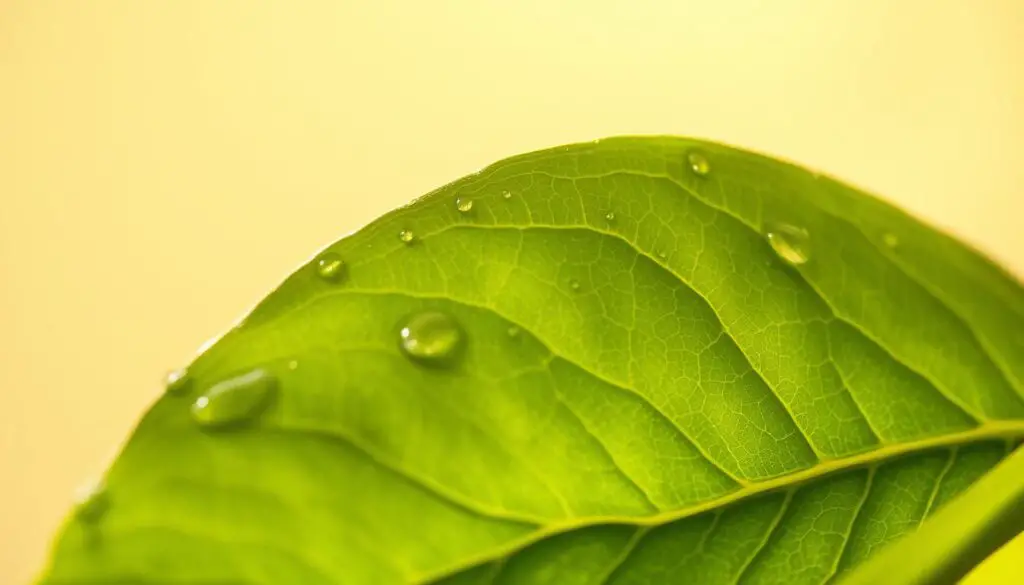
Best Sources of Vitamin E for Natural Hair Care
Eating foods rich in vitamin E can make your hair healthier. Here are some great sources:
- Almonds (6.8 mg per ounce)
- Sunflower seeds (7.4 mg per ounce)
- Avocados (1.5 mg per half fruit)
- Olive oil (2 mg per tablespoon)
- Spinach (1.9 mg per half cup)
| Vitamin E Form | Hair Health Impact |
|---|---|
| Alpha-tocopherol | Primary antioxidant form supporting hair growth |
| Gamma-tocopherol | Supports scalp circulation and cell protection |
| Tocotrienols | Helps reduce oxidative stress in hair follicles |
“Vitamin E is not just a nutrient, but a shield protecting your hair from environmental damage.” – Dermatological Research Institute
Adults need 15 mg of vitamin E every day. Getting it from food is better than supplements. It’s absorbed better and offers more health benefits.
Apply vitamin E topically with a carrier oil like coconut or jojoba. This helps keep your scalp moist and supports hair growth.
Iron and Zinc: Supporting Hair Growth
Your hair’s health is more than just about what you put on it. Iron and zinc are key nutrients for strong, vibrant hair. Knowing how these minerals affect hair growth can improve your hair care.
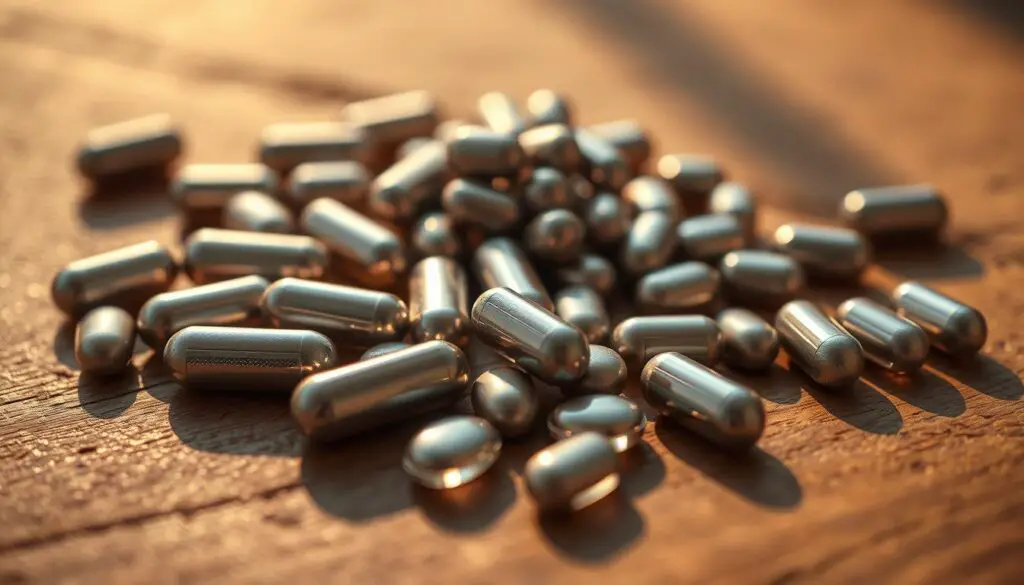
Hair cells are very active and need lots of nutrients. Iron and zinc are vital for hair health and growth.
The Connection Between Iron Deficiency and Hair Loss
Iron deficiency can harm hair growth. Without enough iron, hair follicles may not work well. Studies show that low iron can lead to:
- Less hair production
- More hair shedding
- Slower hair growth
The daily iron intake should be 8 to 18 mg, with pregnant women needing up to 27 mg. Women are especially at risk for iron-related hair problems.
How Zinc Affects Hair Structure
Zinc is crucial for protein making and cell growth, key for hair. Adults need 8 to 11 mg of zinc daily.
“Zinc is not just a mineral, but a key player in maintaining healthy hair structure and growth.” – Nutritional Hair Health Research
Eating foods rich in iron and zinc is great. Include:
- Oysters (highest zinc content)
- Beef
- Sardines
- Pumpkin seeds
While supplements can help, a balanced diet usually has enough nutrients for hair health. Always talk to a doctor before starting supplements.
The Role of Omega-3 Fatty Acids
Omega-3 fatty acids are key nutrients for a healthy scalp and hair. They are good for your overall health and make your hair look better and stronger.
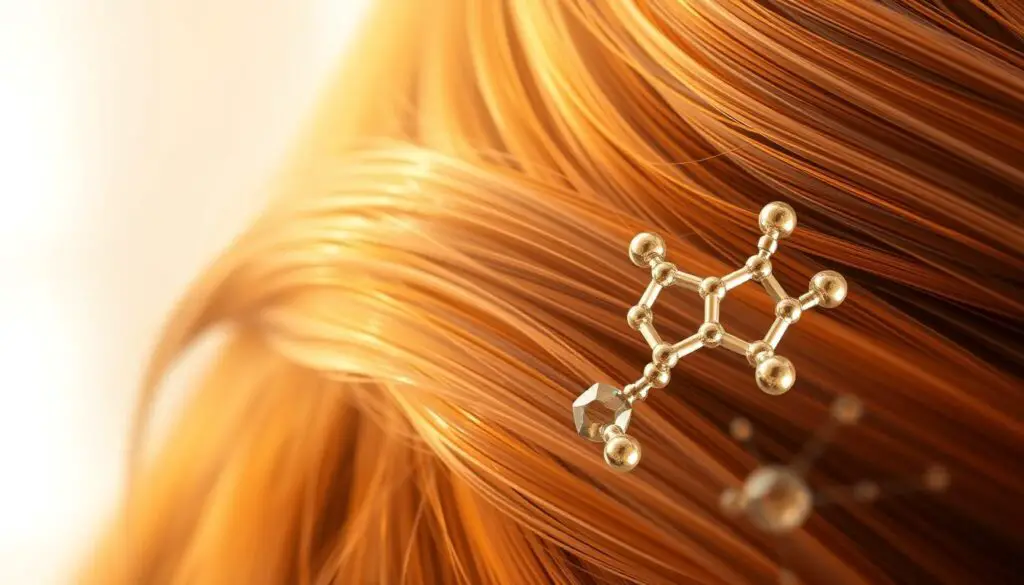
It’s important to know the different types of omega-3s to get the most benefits. There are three main types:
- Alpha-linolenic acid (ALA)
- Eicosapentaenoic acid (EPA)
- Docosahexaenoic acid (DHA)
Benefits for Scalp Health
Research shows omega-3s are great for hair health. A study with 124 women found amazing results. They took omega-3 and omega-6 supplements with antioxidants.
- They saw less hair loss
- Their hair got thicker
- It became denser
The Best Sources of Omega-3s
Your diet is a powerful way to get these essential fats. The World Health Organisation says you should eat 0.8 to 1.1 grams of ALA-type omega-3s and 500 milligrams of EPA and DHA every day.
“Your hair’s health starts with what you eat” – Nutrition Experts
Here are the best sources of omega-3s:
- Fatty fish (salmon, mackerel, herring)
- Walnuts
- Flaxseeds
- Cod liver oil
Experts say eating oily fish 2-3 times a week is good. If you’re thinking about supplements, a common dose is 2 capsules a day. This is about 500 milligrams of omega-3.
Note: Always talk to a healthcare professional before starting any new supplement.
The Effects of Stress on Hair Growth
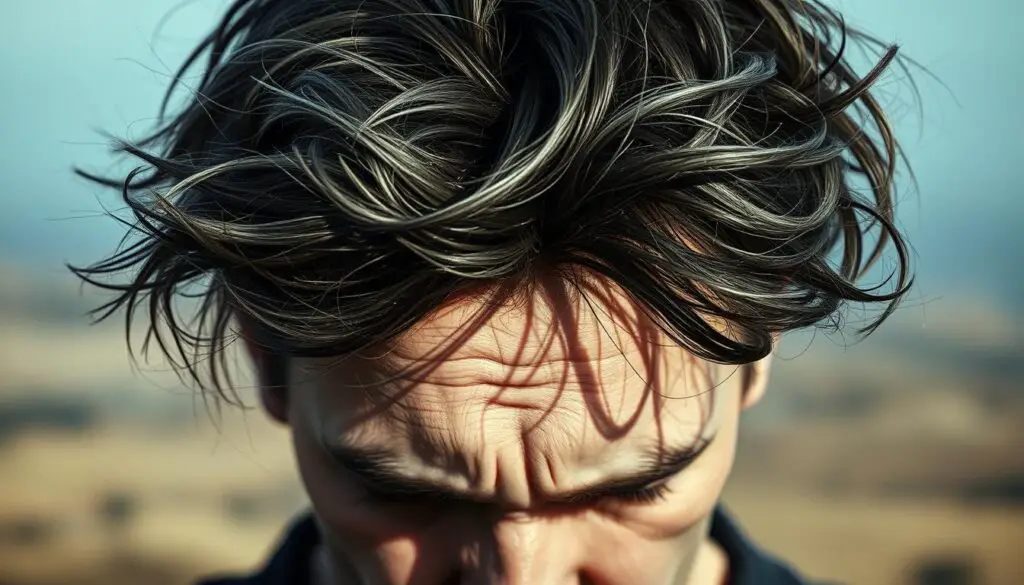
Stress can really hurt your hair growth. It’s key to know how stress affects your hair. Vitamins for hair growth are vital when dealing with stress-related hair issues.
How Stress Disrupts Hair Growth
Chronic stress can lead to telogen effluvium, a type of hair loss. It usually starts three months after a big stressful event. Stress hormones can mess up the hair growth cycle.
- Fast weight loss of about 20 pounds can cause stress-related hair loss
- Normally, we lose 50-100 hairs a day. But stress can make this worse
- Stress hormones might harm hair follicle stem cells
Vitamins that Combat Stress-Related Hair Loss
Some vitamins can help your body deal with stress and support hair growth. B-complex vitamins are key in reducing stress and keeping hair healthy.
“Nutrition is the foundation of resilience against stress-induced hair loss” – Hair Health Experts
Here are some vitamins to fight stress-related hair loss:
- Vitamin B5 (Pantothenic Acid)
- Vitamin B7 (Biotin)
- Vitamin C
- Vitamin D
If you notice unusual hair loss, see a healthcare provider. They might suggest supplements to fix vitamin deficiencies and help your hair grow naturally.
Common Hair Growth Myths Debunked
Finding the right vitamins for hair growth can be tough. Many myths about hair health confuse people. Let’s clear up these misconceptions with solid facts.
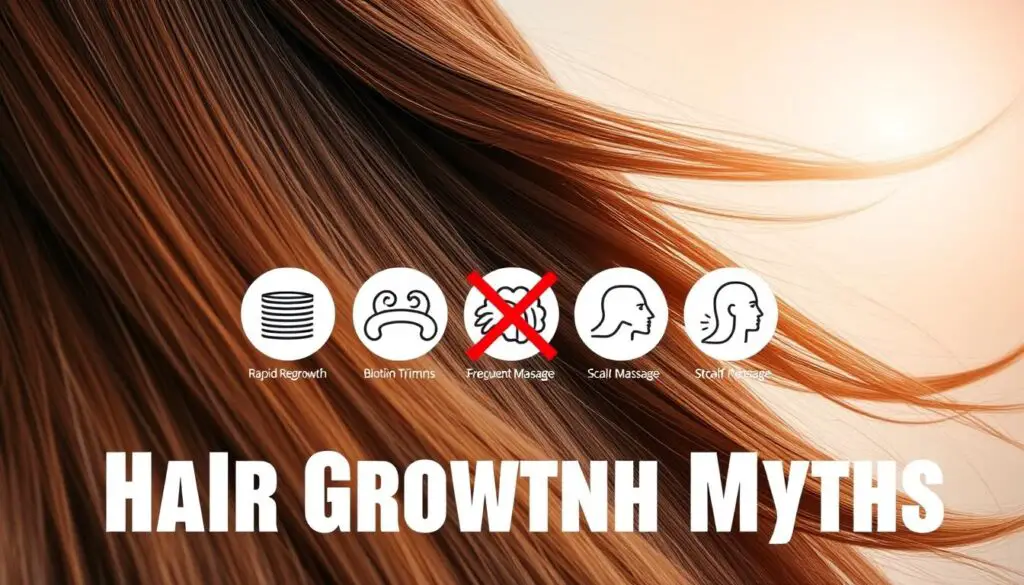
Misconceptions About Vitamins
Some think vitamins for hair growth are magic. But the truth is more complex. Here are some myths to watch out for:
- Cutting hair makes it grow faster (False: Hair growth starts at the roots)
- Daily shampooing is essential for healthy hair
- Supplements can completely reverse hair loss
The Truth About Hair Supplements
It’s important to know what hair supplements can do. The FDA doesn’t check them as closely as medicines. So, not all claims are proven.
“Not all supplements are created equal. Always consult with a healthcare professional before starting any new vitamin regimen.”
| Myth | Reality |
|---|---|
| Vitamins can instantly grow hair | Vitamins support hair health but cannot create instant miracles |
| All supplements work the same | Individual results vary based on genetics and overall health |
| More supplements mean faster growth | Excessive supplements can be harmful |
When looking at vitamins for hair growth, remember a whole approach is best. Good nutrition, managing stress, and overall health are key. Supplements can help, but they’re not enough on their own.
- Consult a healthcare professional
- Choose quality supplements
- Maintain a balanced diet
- Manage stress levels
Pro tip: Look for supplements with scientifically-backed ingredients like biotin, vitamin D, and iron to support your hair growth journey.
Monitoring Your Hair Health
Knowing your hair’s condition is key when looking into vitamins for hair growth. Keeping track of your hair’s progress helps you make better choices about what you eat and how you care for it. By noticing certain signs, you can figure out if you need to change your hair care routine.
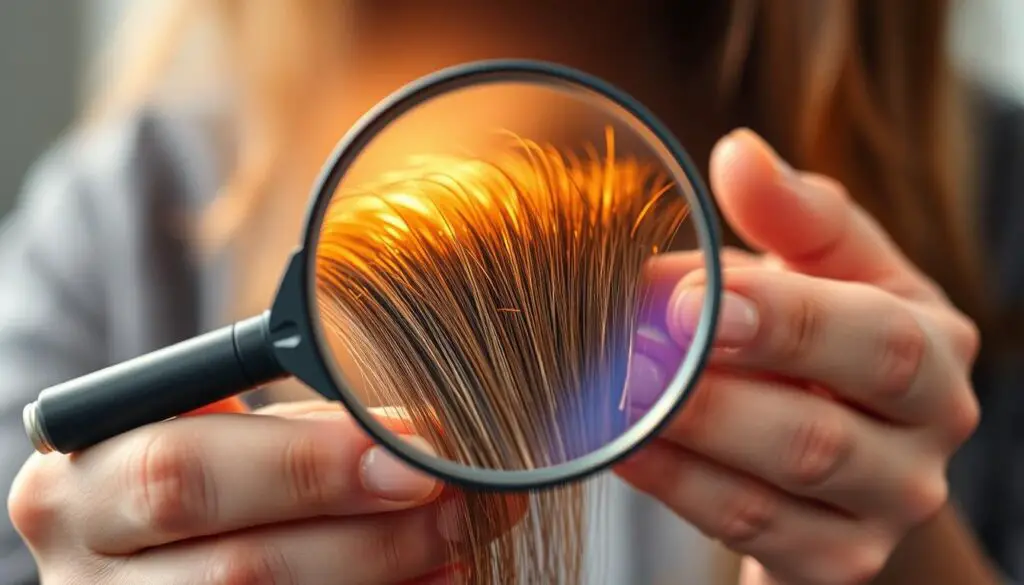
Signs You Might Need More Vitamins
Look out for these signs that your hair might need more nutrients:
- Increased hair shedding during washing or brushing
- Dry, brittle hair texture
- Slow hair growth rate
- Visible thinning or reduced hair density
- Dull, lackluster hair appearance
“Your hair’s condition often reflects your overall nutritional status and health.” – Dermatology Expert
When to Consult a Professional
There are times when you should see a doctor for a detailed check-up on vitamins for hair growth:
- Sudden or excessive hair loss
- Patches of missing hair
- Scalp inflammation or persistent irritation
- Significant changes in hair texture or growth patterns
Doctors can do special tests to find out if you have any nutritional gaps or health issues that might be affecting your hair. They might suggest blood tests to check your vitamin levels, iron, and hormones.
Regular monitoring and professional advice can help you find a focused way to keep your hair healthy and growing well.
Customizing Your Hair Care Routine
Creating a personalized hair care approach can transform your hair health from the inside out. Your unique hair needs require a tailored strategy that goes beyond generic advice.
Personalized Nutrition Plans for Hair
Protein is key for hair structure, making a nutrition plan that supports keratin production crucial. Your diet greatly affects hair growth and strength.
- Include dry fruits like almonds and walnuts to accelerate hair growth
- Consume iron-rich foods such as spinach and beetroot
- Limit junk food that negatively affects hair health
Lifestyle Changes for Better Hair Growth
Developing a holistic approach to hair care involves more than just nutrition. Your daily habits can profoundly influence hair quality and growth.
| Lifestyle Factor | Impact on Hair | Recommended Action |
|---|---|---|
| Stress Management | Reduces hair loss | Practice meditation, yoga |
| Sleep Quality | Supports protein synthesis | Aim for 7-9 hours nightly |
| Hydration | Enhances keratin production | Drink 8 glasses of water daily |
“Your hair reflects your overall health – nurture it from within.”
By understanding your specific hair needs and implementing targeted nutrition and lifestyle changes, you can unlock your hair’s full potential. Achieve vibrant, healthy growth.
The Impact of Hormones on Hair Growth
Hormones are key to your hair’s health and growth. The balance of hormones in your body affects your hair’s thickness, strength, and look. Knowing how hormones work can help you keep your hair healthy.
Hormonal changes can greatly affect your hair’s growth cycle. At different times in your life, hormonal shifts can impact your hair’s health.
Hormonal Imbalances and Their Effects
Many hormonal conditions can affect hair growth and quality:
- Polycystic Ovary Syndrome (PCOS) affects 6-12% of women, often causing hair thinning due to elevated androgen levels
- Hypothyroidism impacts 5-10% of women, leading to brittle and dry hair
- Elevated cortisol from chronic stress can trigger hair shedding in 30-50% of individuals
Vitamins to Support Hormonal Health
Certain vitamins can help with hormonal imbalances:
| Vitamin | Hormonal Benefit | Impact on Hair |
|---|---|---|
| Biotin | Supports metabolic function | Improves growth by 25% |
| Vitamin D | Regulates hormone production | Strengthens hair follicles |
| Zinc | Balances testosterone | Reduces hair loss risk |
“Understanding your body’s hormonal landscape is key to maintaining healthy, vibrant hair.” – Dr. Emily Roberts, Endocrinologist
By focusing on vitamins for hair growth and addressing hormonal imbalances, you can support your hair’s health at any stage of life.
Natural Remedies for Hair Growth
Looking for vitamins for hair growth? Natural remedies can be a big help. They work well with vitamins and help keep your hair strong and healthy.
Natural supplements are showing great promise for hair growth. Studies have found that certain herbs can really boost hair health and make follicles work better.
Herbal Supplements to Explore
- Saw palmetto: Reduces hair fallout by up to 29%
- Ginseng: Stimulates hair growth phase
- Rosemary oil: Comparable to minoxidil in hair count increase
- Pumpkin seed oil: Increases hair density
Combining Vitamins with Natural Treatments
Adding folic acid to herbal supplements can make your hair growth plan even better. Mixing them can help with nutrition and getting follicles to grow.
| Supplement | Potential Benefit | Recommended Usage |
|---|---|---|
| Ginseng | Cellular protection | Daily supplement |
| Aloe Vera | Scalp health | Topical application |
| Green Tea Extract | Hair density improvement | Daily supplement |
Before starting any new supplements, talk to a healthcare professional. They can help make sure you’re getting what your hair needs.
Natural remedies can be powerful allies in your hair growth journey, but patience and consistency are key.
Understanding Hair Types and Needs
Every strand of hair is unique. Knowing your hair type is key when picking vitamins for hair growth. Your hair’s characteristics guide the best nutrition for healthy, vibrant hair.
Hair types range from fine and thin to thick and coarse. Each type needs a special nutrition plan for the best hair growth and health.
Tailoring Vitamins to Different Hair Types
Your hair’s unique traits need a targeted nutrition plan. Here’s how different hair types benefit from specific vitamins:
- Fine Hair: Needs lightweight nutrients to prevent weighing down strands
- Thick Hair: Needs intensive nutritional support to manage volume and strength
- Curly Hair: Demands extra moisture and protein-based vitamins
- Straight Hair: Benefits from balanced vitamin intake for shine and resilience
Special Considerations for Thin or Thick Hair
Thin hair needs vitamins that strengthen and add volume. Thick hair requires nutrients that manage moisture and reduce frizz. Biotin, Vitamin B Complex, and Vitamin D are great for both.
Vitamin Recommendations by Hair Type
| Hair Type | Key Vitamins | Primary Benefits |
|---|---|---|
| Fine Hair | Biotin, Vitamin B12 | Strength, Volume |
| Thick Hair | Vitamin E, Vitamin C | Moisture Management, Circulation |
| Damaged Hair | Keratin, Zinc | Repair, Growth Support |
“Understanding your hair’s unique needs is the first step to achieving optimal hair health through targeted nutrition.” – Hair Care Expert
Genetic factors, hormonal changes, and individual nutritional needs affect hair growth. Talking to a nutritionist can help create a personalized vitamin plan for your hair type and health goals.
Summary: Making Informed Choices
Understanding vitamins for hair growth means looking at nutrition and health as a whole. By age 50, about 50% of men and women face hair loss. It’s important to take action early.
Your hair health shows how well you’re eating. Checking your diet and supplements can really help. This is because your hair reflects your nutrition.
Choosing hair supplements can be tricky. The market has grown a lot, but the FDA doesn’t check these products. So, pick vitamins that fit your needs well.
Assessing Your Vitamin Intake
Focus on eating foods full of good stuff for hair. Eat proteins, iron-rich foods, and vitamins that help hair follicles. Foods like fatty fish, dark greens, and whole grains are great.
They give you omega-3s, biotin, and iron. These help make your hair strong and healthy.
Developing a Balanced Hair Care Regimen
Make a hair care plan that’s just for you. Watch what you eat, keep stress low, and use supplements if needed. Remember, good nutrition and patience are key for healthy hair.

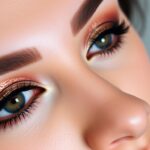
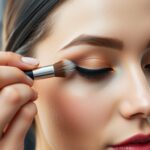
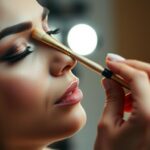
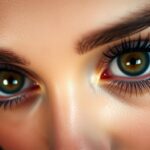


1 thought on “Vitamins for Hair Growth: What Works Best”